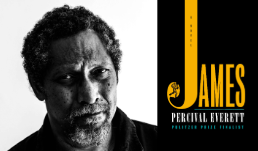- Categories:
A Q&A with Percival Everett, Author of April Indie Next List Top Pick “James”
- By Zoe Perzo
Independent booksellers across the country have chosen Percival Everett’s James (Doubleday) as their top pick for the April 2024 Indie Next List.

James takes a new look at a classic, telling the story of Jim, the enslaved man in The Adventures of Huckleberry Finn.
“Percival Everett, deep into his brilliant career, adds another indelible novel into his vast canon. James reimagines an emblematic — and yes, problematic — American classic and asks about life, history, and our cultural psyche,” said Stephen Sparks of Point Reyes Books in Point Reyes Station, California.
Here, Everett discusses his work with Bookselling This Week.
Bookselling This Week: James breathes new life into an existing character. And in departing from the source material, gives us a nuanced look at Huck’s companion. What inspired you to tackle this project? When did you look at Jim and think “I’ll tell his story”?
Percival Everett: It's important to point out that my writing this novel is in no way a reflection of any dissatisfaction with Twain's novel. The Adventures of Huckleberry Finn is a great work. It is deeply American in its exploration of race as the defining element of the American experience. A few years ago, I wondered if anyone had considered the novel from Jim's point of view. I was surprised that no one had and then noted that I hadn't either. I started the project then.
BTW: For James, you’re interacting both with history and with an existing work. Can you tell us a little about your research and writing process?
PE: I was so familiar with Huck Finn that the first thing I had to do was take the world from Twain. I read the novel some fifteen times in a row so that it became a jumble, a blur that I could not simply repeat. I had to do this to own the material. Of course, I also read about the period and Hannibal, Missouri, and the Mississippi River.
BTW: Because The Adventures of Huckleberry Finn is so widely read — casually and academically — but isn’t typically fodder for retellings, James is well-situated to alter perception and study of the classic novel. I can absolutely see English teachers pairing the two together in a unit. Do you have any thoughts about that? What do you hope readers will take away from it?
PE: It, of course, depends on the reader. I'm not smart enough to guess what the work will do in the world. I flatter myself to think that I am in a discourse with Twain. James is the novel that Twain could not write. Just as I am incapable of writing Huck's story.
BTW: Could you talk a little bit about the role of books and indie bookstores in your life?
PE: Independent bookstores are the center of intellectual life for most of us. The tables covered with titles represent possibilities. A table of books is a work of art itself.

